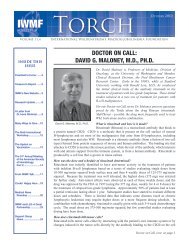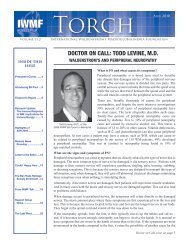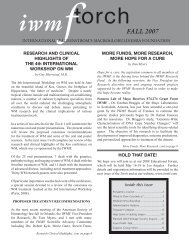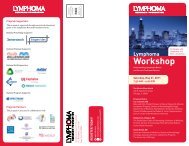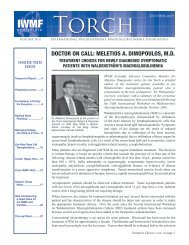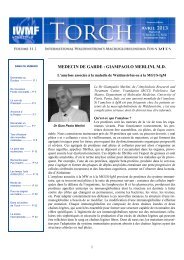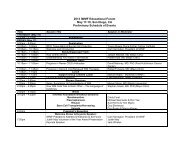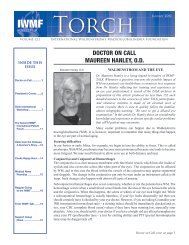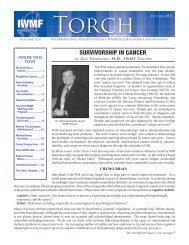English - International Waldenstrom's Macroglobulinemia Foundation
English - International Waldenstrom's Macroglobulinemia Foundation
English - International Waldenstrom's Macroglobulinemia Foundation
You also want an ePaper? Increase the reach of your titles
YUMPU automatically turns print PDFs into web optimized ePapers that Google loves.
A Self-Care Approach, cont. from page 19<br />
relaxation response. Many find it quite restorative. You<br />
may still be aware of your fears, but you are diffusing<br />
them by turning down their volume. Ultimately, any of<br />
these methods should reduce worry and anxiety and offer<br />
better emotional stability, concentration, and mindfulness.<br />
Remember, the mind also needs to rest from the stress of<br />
cancer.<br />
Mindfulness is a term that relates to internal awareness.<br />
One stays in the present, observing rather than responding.<br />
Halting a reaction allows for the exploration of alternative<br />
perspectives. In a calm, focused way we can tap into the<br />
current conflict and discover the resources we need to<br />
manage it. Becoming more mindful offers us more choices<br />
in dealing with our emotions. We can learn to replace<br />
our established trigger responses with new habits and to<br />
interrupt that cycle of negative thoughts by just putting<br />
them on hold and reeling them in. Once we do that we can<br />
break the problem up into smaller parts and spread them<br />
out so they won’t seem so overwhelming to us. Sometimes<br />
we can control our anxious state by offering our minds a<br />
momentary distraction, long enough to allow the anxiety<br />
to pass. Mindfulness will help us become more resilient,<br />
but it does not require that we force our will into a state of<br />
positivity. Mindfulness is also acceptance that some degree<br />
of anxiety will always be normal for us, particularly when<br />
stressors are unfamiliar and unpredictable. Learning how<br />
to keep our distress thermometer at a fairly comfortable<br />
degree should be our self-care goal.<br />
If adjusting to our cancer is the goal of our care plan, we<br />
can claim successful adjustment if we can minimize its<br />
disruptions. Are we able to manage specific cancer-related<br />
problems as they arise? Can we regulate our emotional<br />
distress? Have we remained active in ways that continue<br />
to hold meaning and importance for us? Adaptation to<br />
a chronic cancer is ongoing, and we may need the help<br />
of a professional at any given point in time. Even after<br />
successful treatment it’s not unusual to find distress<br />
heightened and vulnerability renewed.<br />
Discovering a balance between positive expectations and<br />
ongoing fears can be achieved in therapy. To take care<br />
of yourself also means to seek help or direction from<br />
others when needed. To seek guidance and support while<br />
exploring and adjusting to a life with cancer is a positive<br />
step to take at any point. Ideally, the counselor you choose<br />
should be skilled in psychotherapy with a solid background<br />
in oncology therapy. Many cancer organizations or<br />
cancer centers can offer a recommendation for services.<br />
Connectedness is key, and the initial consultation should<br />
help you determine if the therapist and the type of<br />
therapy offered will suit your needs. It’s not unusual if<br />
family therapy sessions are recommended according to<br />
your particular situation. Antidepressants or anti-anxiety<br />
medication may be prescribed for temporary or even<br />
long-term relief of symptoms. Group therapy offers a<br />
supportive environment with group members who have<br />
the same cancer concerns. Self-help groups function<br />
under the control of their members and help foster hope<br />
and confidence in those who are struggling. There are also<br />
therapeutic groups led by a trained professional assisting<br />
and directing the group and offering supportive feedback.<br />
In summary, we have at our disposal an array of methods<br />
to explore or from which to select in formulating a<br />
self-directed care plan. I’ve included only some of the<br />
popular and possibly more traditional techniques. I make<br />
no recommendation for one approach over another. We<br />
are each unique, and this simple fact means that the<br />
appropriate mode of self-care varies from individual<br />
to individual. My only advice is to find what helps you<br />
directly and keep doing it! If it stops helping, seek out<br />
other approved mental health alternatives that will offer<br />
the well-being that you are entitled to. Thankfully, our<br />
treatments can offer us many more years of active living.<br />
Our own self-care can significantly influence the quality<br />
of those years.<br />
IWMF member Wanda Huskins is a behavioral health RN.<br />
This article is based on her professonal experience but is<br />
not intended to to be a substitute for professional medical<br />
advice. Wanda reminds us to always seek the advice of<br />
our oncologist or qualified health care provider regarding<br />
cancer-related issues<br />
Have Your Say<br />
The Torch welcomes letters, articles, or suggestions for articles. If you have something you’d like to share with<br />
your fellow WMers, please contact Torch editor Alice Riginos at ariginos@me.com<br />
20 IWMF TORCH Volume 14.2



